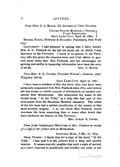
[p. vi]
From Mrs. S. A. COOKE, President Woman's National Anti-Polygamy Society.
SALT LAKE CITY, April 16, 1881.
I have been a resident of this city since 1852, and have been personally acquainted with Mrs. Paddock since 1871, and believe she has access to reliable sources of information on matters connected with Mormonism. She mentioned my name in her former book, "In the Toils," as a lady who had care of two boys saved from the Mountain Meadow massacre. The eldest of the two boys had a perfect recollection of the scenes in that most horrible tragedy. I do not think Mrs. Paddock would overstate the facts respecting that or many other deeds that have darkened the history of this Territory.
MRS. SARAH A. COOKE.
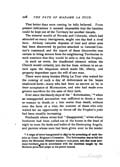
[p. 226]
* A reign of terror inaugurated in 1857 by the preaching of such fanatics as Grant, Brigham's Counselor. The Reformation was at fulltide when the Mountain Meadow massacre took place, and that most atrocious butchery was in accordance with the doctrines taught by the Mormon press and pulpit at the period named.
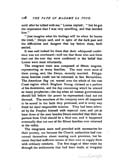
[p. 128]
The emigrants were well provided with necessaries for their journey, not because the Church authorities had concerned themselves about making such provision, but because they had suflicient means of their own to supply them
with ordinary comforts. The first stage of their route lay through the settlements that had been made, at irregular
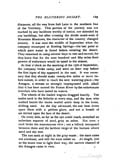
[p. 129]
distances, all the way from Salt Lake to the southern line of the Territory. This portion of the joumey was not marked by any incidents worthy of notice, nor attended by any hardships, but after crossing the divide south-west of Mountain Meadows, the character of the country changed entirely. It was near the middle of September when the company encamped at Resting Springs—the last point at which pure water is found before entering the desert. They remained in camp several days to rest and recruit, for they knew that for the next hundred and fifty miles their powers of endurance would be taxed to the utmost.
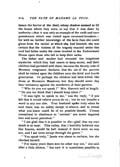
[p. 214]
The father and mother had revealed the iniquitous mysteries which they had sworn to keep secret, and their children had perished with them, because the bloody code of Mormon vengeance declares that the sin of the parents shall be visited upon the children unto the third and fourth generation. Or perhaps the children had been killed, like those at Mountain Meadows, lest they should some day bear testimony against the murderers of their parents.
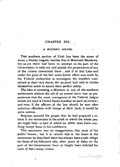
[p. 231]
THE southern portion of Utah has been the scene of many a bloody tragedy besides that of Mountain Meadows, but as yet there had been no attempt on the part of the Government to seek out and punish the perpetrators of any of the crimes committed there; and if in Salt Lake and under the guns of the fort some feeble effort was made by the Federal authorities to investigate the murders committed at their very doors, the accused had only to betake themselves south to assure their perfect safety.
The idea of arresting a Mormon in one of the southern settlements without the aid of an armed force was so preposterous that the most courageous of the Federal judges would not send a United States marshal on such an errand; and even if the officers of the law should be sent after notorious offenders with troops at their back, it would be quite useless.
Brigham assured his people that he had prepared a retreat in the mountains of the south in which the whole people might hide—a spot of which no white man knew anything except those in his confidence.
This assurance was an exaggeration, like most of his public boasts; but it is certain that in the heart of the mountains he described there has always been a safe refuge for those of his followers who, after years of delay on the part of the Government, have at length been indicted for some of their many crimes.
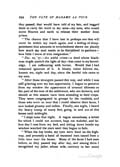
[p. 254]
"Dec. 10, '57.—An awful crime—a deed whose blackness might quench the light of day—has come to my knowledge. I am suffocating with horror. Would that I had remained ignorant of it. A bloody vision follows me, haunts me, night and day, since the fearful tale came to my ears.
"After those strangers passed this way, and while I was still grieving over my lost opportunity, I began to perceive from my window the appearance of unusual idleness on the part of the men of the settlement, who are farmers, and should at this season have been attending to their crops. They were congregated in groups by the roadside, and those who were so near that I could observe their faces, I saw looked gloomy and sullen. Finally, one night, I heard the heavy tramp of many feet, going in and out of this house until midnight.
"I slept none that night. A vague uneasiness, a terror for which I could not account, kept me wakeful, and before day I rose from my bed, and sitting down beside my window watched the stars until they began to fade.
"When the day broke, my eyes were fixed on the highway, and presently a band of mounted men issued from a little lane near the house. Many of the faces I had seen before, as they passed day after day, and among them I recognized my jailer, whose wife, contrary to her usual
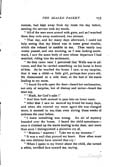
[p. 255]
custom, had kept away from my room the day before, sending the servant with my meals.
"All of the men were armed with guns, and as I watched them they rode away southward, two abreast.
"That day, and for many days afterward, I could not help seeing that my friend was in some great trouble, which she refused to confide to me. Thus nearly two weeks passed, and one morning, as I was looking southward, I saw the same body of men whose departure I had watched, riding into the settlement.
"As they came near I perceived that Wells was in advance, and that he carried something on his horse in front of him. As he reached the house I saw, to my surprise, that it was a child—a little girl, perhaps four years old. He dismounted at a side door, at the foot of the stairs leading to my room.
"I heard his wife open the door—heard her exclamation, not only of surprise, but of dismay and terror—heard the man say,
"'Hush, for God's sake!'
"And then both seemed to pass into an inner room.
"After that I saw no more of my friend for many days, and when she entered my room again she was changed more, it seemed to me, than even during those weeks of sickness the year before.
"I knew something was wrong. An air of mystery brooded over the house. I heard the child sometimes—once it climbed up the stairs leading to my door, and more than once I distinguished a plaintive cry of,
"'Mamma! mamma!' Take me to my mamma!'
"It was a wail that pierced my heart. How often must my own children have uttered that cry!
"When I spoke to my friend about the child, she turned a white, terrified face toward me, saying,
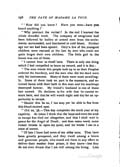
[p. 256]
"'How did you know? Have you seen—have you heard anything?'
"Why protract the recital? In the end I learned the whole dreadful truth. The company of emigrants had been followed by bodies of armed men from the settlements, surrounded, and butchered in cold blood. Neither age nor sex had been spared. Only a few of the youngest children were rescued at the last by men who could not quite forget their own children. The little girl in the house was one of these.
"I cannot bear to dwell here. There is only one thing which I feel compelled to leave on record, and it is this:
"The man whom this people look up to as their Prophet ordered the butchery, and the men who did the deed were only his instruments. Many of them went most unwillingly. Some of them took no part in the massacre, and returned home with their faith in this man and his teachings destroyed forever. My friend's husband is one of those last named. He declares to his wife that he cannot remain here, and that he will watch night and day for an opportunity to escape.
"Should this be so, I too may yet be able to flee from this blood-stained spot.
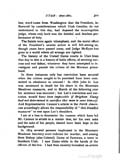
[p. 301]
In 1874 several persons implicated in the Mountain Meadows butchery were indicted for murder, and among them Bishop (also Colonel) Dame of Parowan, a town in Southern Utah. I saw Dame while in the hands of the officers of the law. I had then recently furnished an article

[p. 302]
to one of the Washington papers, giving an account of the massacre, and Dame, aware of this fact, asked:
"Did you say anything about me?"
"No," was the answer.
Dame. "Do you think me guilty?"
The Writer. "I shall wait to hear the evidence before forming an opinion as to your guilt."
Dame. "Before God, madam, I am innocent. I did not give the order for the massacre, and I am not responsible for the orders that were passed over my head."
Dame, it will be remembered, was the superior officer of John D. Lee, who was made a scapegoat by the Mormon leaders, and sacrificed to save the real instigators of the massacre. The orders which were, as Dame said, "passed over his head," must have emanated from his superior officers. Lee is in his grave, but his dying confession, which has been abundantly corroborated by the testimony of old residents of the Territory, is extant, and contains accusations that will not down, even at the bidding of ex-Delegate Cannon.
The following are some of Lee's dying statements:
"The Mountain Meadow Massacre was the result of the direct teachings of Brigham Young, and it was done by the order of those high in authority in the Mormon community. After the massacre I was sent to Brigham Young to make a report of it. I went and told him all. I said, 'Sustain me, or release me from my endowment oath to avenge the blood of the prophets.'
"Brigham sent me away, telling me he would commune with God and let me know the result. The next morning I went back to him and he said: 'Brother Lee, the people did just right—only they were a little too hasty. I have evidence from God that the act was right. I sustain you and the brethren in all that you did. All I fear is treach-
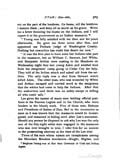
[p. 303]
ery on the part of the brethren. Go home, tell the brethren I sustain them; and keep all as secret as the grave. Write me a letter throwing the blame on the Indians, and I will report it to the government as an Indian massacre.'*
"Young was fully satisfied with me then and for years afterwards. He gave me three wives after that, and appointed me Probate judge of Washington County. Nothing but cowardice has made him desert me now."
"It was the first plan to have none but Indians take part in the massacre, but as William C. Stewart, Joel White, and Benjamin Arthur were coming to the Meadows on Wednesday night they met young Aden and another man from the emigrants' camp going to Cedar City for help. They told of the Indian attack and asked aid from the settlers. The only reply was a shot from Stewart which killed Aden. The other man, who was wounded by White and Arthur, escaped and carried word to the emigrants that the whites had come to help the Indians. After that the authorities said there was no safety except in killing all who could talk."
Lee gives the names of many men holding official positions in the Nauvoo Legion and in the Church, who were leaders in the bloody work. Five of these men, Bishops and Presidents of Stakes of Zion, fled to the mountains as soon as it was known that the massacre would be investigated, and remained in hiding until after Lee's execution. Should any person be disposed to ask why Lee was the only one of the fifty-eight white men engaged in the massacre who was ever brought to trial, I refer him for an answer to the prosecuting attorney at the time of the Lee trial.
Three of the men whose names are conspicuous among the Mountain Meadow murderers—Haight, Higbee, and
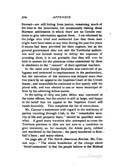
[p. 304]
Stewart—are still hiding from justice, remaining much of the time in the mountains, but occasionally visiting those Mormon settlements in which there are no Gentile residents to give information against them. I am informed by the judge who tried and sentenced Lee that these men might have been taken at any time during the past five years if means had been provided for their capture, but as the general government does not, and the Territorial authorities will not furnish money to defray the expenses of arresting them, it is not probable that they will ever be held to answer for the atrocious crime committed by them in obedience to the "council" of their spiritual teachers.
In the same year George Reynolds was convicted of polygamy and sentenced to imprisonment in the penitentiary but the execution of his sentence was delayed more than two years by an appeal to the Supreme Court of the United States; and meanwhile he continued to live openly with his plural wife, and was elected to one or more municipal offices by his admiring fellow-saints.
In the spring of 1879 one John Miles was convicted of the same offense, but the convict is still at large, and happy in the belief that his appeal to the Supreme Court will result favorably. This completes the list of convictions.
Mr. Cannon's statements with regard to the testimony of parties traveling through Utah, to the "remarkable security of life and property there," should be qualified somewhat. A good many travelers who attempted to cross the Territory previous to 1870 are not now in a condition to give testimony, as, for example, the Aiken party, robbed and murdered by the Danites; the party murdered in Kimball's barn; and many others.
On page 460 of The North American Review, Mr. Cannon says: "The whole foundation of the charge about 'blood-atonement' is that the people believe in the Biblical
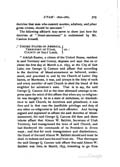
[p. 305]
doctrine that men who commit murder, adultery, and other gross crimes, should be executed."
The following affidavit may serve to show just how the doctrine of "blood-atonement" is understood by Mr. Cannon himself.
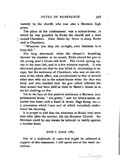
[p. 347]
NOTE L (PAGE 176).
Out of a multitude of cases that might be adduced in support of this statement, I will quote two of the most notorious:
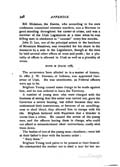
[p. 348]
Bill Hickman, the Danite, who according to his own confession committed nineteen murders, was a Mormon in good standing throughout his career of crime, and was a member of the Utah Legislature at a time when he was killing men in obedience to "counsel" every few months.
John D. Lee, one of the principal actors in the butchery of Mountain Meadows, was rewarded for his share in the massacre by a seat in the Legislature, though at the time he held several other offices of trust and profit; for a plurality of offices is allowed in Utah as well as a plurality of wives.